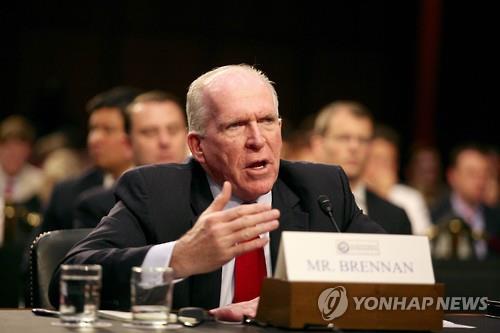- California Assembly OKs highest minimum wage in nation
- S. Korea unveils first graphic cigarette warnings
- US joins with South Korea, Japan in bid to deter North Korea
- LPGA golfer Chun In-gee finally back in action
- S. Korea won’t be top seed in final World Cup qualification round
- US men’s soccer misses 2nd straight Olympics
- US back on track in qualifying with 4-0 win over Guatemala
- High-intensity workout injuries spawn cottage industry
- CDC expands range of Zika mosquitoes into parts of Northeast
- Who knew? ‘The Walking Dead’ is helping families connect
N.K. nuclear program top ‘blinking-red’ problems: CIA chief
WASHINGTON, June 16 (Yonhap) — North Korea’s nuclear program is one of the top “blinking-red” problems that should be highlighted at an intelligence briefing for the next U.S. president, along with cyberthreats and terrorism, the CIA chief said Thursday.
“Proliferation is something that we cannot forget about, which is brought into stark relief by the activities of North Korea and Kim Jong-un, and the continued development of his nuclear program and ballistic missile capability,” CIA Director John Brennan said at a Senate Intelligence Committee hearing.
Speaking in response to a question about the key issues that should be highlighted for the next president, Brennan also picked cyberthreats, terrorism and instability across the Middle East and Africa as other pressing problems.
North Korea conducted its fourth nuclear test in January and a long-range rocket launch the following month. The communist nation is also believed to have recently started reprocessing spent nuclear fuel to harvest plutonium for nuclear weapons.
Earlier this week, the Washington-based think tank Institute for Science and International Security said that the North is believed to have produced an additional four to six nuclear weapons since late 2014 and its total arsenal is now estimated at between 13-21 weapons.
“I have never seen a time when our country faced such a wide variety of threats to our national security. If you run your fingers along almost any portion of the map, from Asia Pacific to North Africa, you will quickly find a flashpoint with global implications,” Brennan said.
“China is modernizing its military and extending its reach in the South China Sea. North Korea is expanding its nuclear weapons program. Russia is threatening its neighbors and aggressively reasserting itself on the global stage,” he said. “And then there is the cyber domain, where states and sub-national actors are threatening financial systems, transportation networks and organizations of every stripe inside government and out.”
Asked about the North’s cyber capabilities, Brennan said it is what the U.S. should be concerned about.
“I think that the North Koreans have developed a cyber capability, as we’ve seen some recent incidents over the last year or two, where it has been employed,” he said. “I think it is something that we need to be concerned about, given Kim Jong-un’s penchant to use whatever capabilities he might have to cause problems.”
After the North’s fourth nuclear test in January and a long-range rocket launch in February, the U.S. has led the U.N. Security Council to adopt the toughest-ever sanctions on Pyongyang while adoping its own unilateral sanctions on the communist nation.
Earlier this month, the U.S. Treasury Department also designated the North as a “primary money laundering concern,” a powerful sanction designed to cut off the provocative regime from the international banking system for defiantly pursuing nuclear and missile development.
Treasury Secretary Jacob Lew stressed the importance of cooperation with China in dealing with the North.
“A strong U.S.-China relationship has been integral to increasing the effectiveness of tools like financial sanctions,” he said at the American Enterprise Institute. “Close cooperation was critical in implementing sanctions on Iran and continues to be essential in responding to North Korea’s nuclear provocations.”













